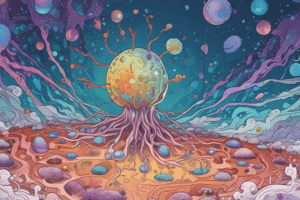Podcast
Questions and Answers
What is the primary characteristic of autoimmune diseases?
What is the primary characteristic of autoimmune diseases?
- They are always easy to cure
- They result from the immune system attacking the body's own cells (correct)
- They only affect one organ in the body
- They are caused by viruses
Which factor is NOT mentioned as a contributor to cancer development?
Which factor is NOT mentioned as a contributor to cancer development?
- Environmental factors
- Lifestyle choices
- Dietary habits (correct)
- Genetic mutations
What distinguishes chronic diseases from other types of diseases?
What distinguishes chronic diseases from other types of diseases?
- They require ongoing medical care and management (correct)
- They primarily affect young individuals
- They are always curable with medication
- They are only temporary conditions
Which type of disease is characterized by uncontrolled cell growth and invasion of other tissues?
Which type of disease is characterized by uncontrolled cell growth and invasion of other tissues?
Which type of diseases are caused by pathogens like bacteria, viruses, parasites, or fungi?
Which type of diseases are caused by pathogens like bacteria, viruses, parasites, or fungi?
Which type of diseases may require treatments ranging from antibiotics and antiviral medications to organ transplants?
Which type of diseases may require treatments ranging from antibiotics and antiviral medications to organ transplants?
Which type of diseases involve illnesses affecting the heart and blood vessels?
Which type of diseases involve illnesses affecting the heart and blood vessels?
Which type of diseases are characterized by the body's immune system attacking its own cells?
Which type of diseases are characterized by the body's immune system attacking its own cells?
Flashcards are hidden until you start studying
Study Notes
Exploring Diseases: A Comprehensive Look at Autoimmune, Cancer, Chronic, Infectious, and Cardiovascular Diseases
Diseases are unwanted alterations in the human body, causing discomfort, impairment, or even death. In this article, we'll explore various types of diseases, specifically focusing on autoimmune diseases, cancer, chronic diseases, infectious diseases, and cardiovascular diseases.
Autoimmune Diseases
Autoimmune diseases occur when the immune system mistakenly attacks the body's own cells and tissues. These illnesses can affect multiple organs and systems, causing symptoms such as inflammation, pain, and fatigue. Some common examples include rheumatoid arthritis, lupus, multiple sclerosis, and psoriasis.
Cancer
Cancer is a group of diseases characterized by uncontrolled cell growth and the ability of these cells to invade other tissues and spread throughout the body. Although the reasons for cancer development are still being researched, it is known that genetic mutations, environmental factors, and lifestyle choices all contribute to the risk of developing cancer. Some prevalent types of cancer include lung, breast, prostate, and colorectal cancer.
Chronic Diseases
Chronic diseases are long-lasting conditions that are difficult to cure or manage. These diseases can have debilitating effects on the body and require ongoing medical care and management to prevent complications. Examples of chronic diseases include diabetes, hypertension, chronic kidney disease, asthma, and arthritis.
Infectious Diseases
Infectious diseases are illnesses caused by pathogens, such as bacteria, viruses, parasites, or fungi. These diseases can spread through direct contact, contaminated water, or contaminated food. Examples of infectious diseases include the common cold, influenza, tuberculosis, malaria, and Ebola.
Cardiovascular Diseases
Cardiovascular diseases encompass a broad range of illnesses affecting the heart and blood vessels. These diseases can lead to reduced blood flow, increased risk of blood clots, and damage to the heart and surrounding organs. Some examples of cardiovascular diseases include hypertension (high blood pressure), coronary artery disease, heart attack, stroke, and heart failure.
Treatments for diseases differ depending on the type, severity, and stage of illness. From medical interventions such as antibiotics and antiviral medications to surgical procedures and organ transplants, to lifestyle changes like improved nutrition and exercise, patients may require a multi-faceted approach to manage their health.
In conclusion, diseases come in various forms, causing a myriad of symptoms and requiring different treatment methods. By understanding the unique characteristics of autoimmune, cancer, chronic, infectious, and cardiovascular diseases, we can better appreciate the complexity of human health and wellness.
Studying That Suits You
Use AI to generate personalized quizzes and flashcards to suit your learning preferences.




